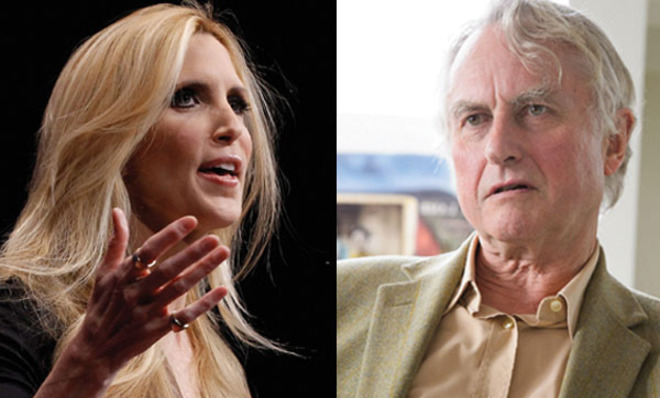What Ann Coulter and atheist Richard Dawkins have in common
Hating on the faithful has produced some strange bedfellows

A free daily email with the biggest news stories of the day – and the best features from TheWeek.com
You are now subscribed
Your newsletter sign-up was successful
Dr. Kent Brantly, the American physician who contracted Ebola while treating the virus in Liberia, has now fully recovered. A month after falling ill with the famously lethal fever, Brantly is now walking, talking, and returning to business as usual. The only thing more surprising than Brantly's sudden and total recovery has been the inability of particular pundits to cope with it in a sane, humane fashion.
For someone who risked his life to perform charitable medical care, Brantly has incurred a truly mind-boggling level of backlash. After he thanked God for his recovery in a press conference — something any rational person would expect of an openly Christian doctor whose overseas medical work was funded by Christian charity — Brantly's speech was dubbed "bizarre," and he was subsequently labeled "douchebag of the day" by the vanguard of irate internet scientism. The complaint they lodged against Brantly was that by praising God he was failing to give "science" its due.
This is a specious understanding of what Christians mean when they praise the work of God in a medical recovery; it is highly unlikely that Brantly, himself a physician who treats others as an act of Christian charity, believes that the work of God is separate from work of medicine. Rather, he probably views them as inextricable, which isn't an atypical view for faithful Christians. But it's challenging to score points against perceived cultural rivals when ignoring nuance, and on that count the anti-Brantly net warriors have good precedent from both the Christian right and atheists.
The Week
Escape your echo chamber. Get the facts behind the news, plus analysis from multiple perspectives.

Sign up for The Week's Free Newsletters
From our morning news briefing to a weekly Good News Newsletter, get the best of The Week delivered directly to your inbox.
From our morning news briefing to a weekly Good News Newsletter, get the best of The Week delivered directly to your inbox.
Consider, for example, Ann Coulter, whose vicious diatribe against Brantly made the rounds in early August. Like the pro-science twitter hoard accusing Brantly of being a "douchebag," Coulter intentionally misconstrued the doctor's intentions and behavior in the most negative light possible. Chalking all of Brantly's charitable motives up to "narcissism," Coulter berated him for allegedly showing off via overseas charity rather than sticking to humble, anonymous down home stuff — as though he knew he would fall ill, the only reason his charity earned media attention.
In effect, Coulter's criticism mirrored atheist and evolutionary biologist Richard Dawkins' latest foray into outrage. Replying to a fan on twitter, Dawkins recently claimed it would be "immoral" not to abort a child diagnosed with Down syndrome in the womb; in the ensuing outcry, Dawkins expressed exasperated disbelief at the very idea anyone genuinely opposed abortion on moral grounds, tweeting:
Dawkins went on to recite the same old every-sperm-is-sacred points meant to demonstrate dishonesty on the part of those opposing abortion without ever engaging honestly with the idea that they truly, genuinely, without any glaring hypocrisy consider abortion to have a different moral weight than he does.
For Dawkins and his followers, therefore, opposing abortion is just willful ignorance and hypocrisy. Coulter, who sees only narcissistic spotlight-seeking in Brantly's charity, is up to something similar. Neither is willing to concede that the objects of their derision should be taken seriously. Instead, they blithely presume dishonesty, then press on with their attacks.
A free daily email with the biggest news stories of the day – and the best features from TheWeek.com
This is because — for both Coulter and Dawkins — the point is to claim the moral high ground, not to make a more convincing point. For Coulter, Brantly and Christians like him (she lists, for example, Pope Francis) are a problem because their service and dedication to others don't match up with her hyper nationalistic form of Christianity. She can't argue that they're wrong to be charitable, exactly, so she argues that they don't even really believe the tenets of Christianity and are dishonest from the get-go. The inference, of course, is that she is the genuine Christian. For Dawkins, the story is much the same: Those outraged by his pro-abortion comments are depicted as willfully unenlightened troglodytes attacking the bearer of truth.
In light of these pundits, the online response to Brantly's low-key, mild press conference isn't so surprising. People who have a bone to pick with religion is hardly news. The only interesting fact is that they've found such strange bedfellows.
-
 Bonfire of the Murdochs: an ‘utterly gripping’ book
Bonfire of the Murdochs: an ‘utterly gripping’ bookThe Week Recommends Gabriel Sherman examines Rupert Murdoch’s ‘war of succession’ over his media empire
-
 Gwen John: Strange Beauties – a ‘superb’ retrospective
Gwen John: Strange Beauties – a ‘superb’ retrospectiveThe Week Recommends ‘Daunting’ show at the National Museum Cardiff plunges viewers into the Welsh artist’s ‘spiritual, austere existence’
-
 Should the EU and UK join Trump’s board of peace?
Should the EU and UK join Trump’s board of peace?Today's Big Question After rushing to praise the initiative European leaders are now alarmed